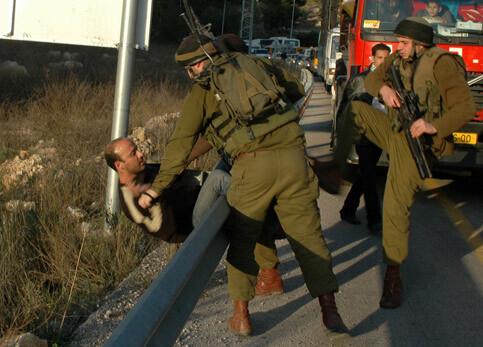
Israeli soldiers beat a Palestinian taxi driver before arresting him at a checkpoint near the West Bank city of Ramallah, 11 January 2007. (MaanImages/Fadi Tanas)
4 January 2006
Israeli forces invaded Ramallah, West Bank today, marking the most severe incursion in several months. According to English-language Al Jazeera, four people were killed and about twenty wounded.
When the incursion began I was in downtown Ramallah, on a service (a small bus) coming back from spending the day in Jerusalem.
I arrived from the east on a busy road and we stopped at an intersection, one block from the city-center. There was a large amount of traffic at this intersection and horns were blaring. I gradually became aware of an increasing level of intensity and anxiety. I was on the right side of the bus, looking out of the window and I noticed several women running frantically into a store. It dawned on me that something was wrong. I looked out the windows on the other side and saw two Israeli armored jeeps immediately beside my bus. Just as I registered this, guns began going off, firing short quieter bullets in quick succession and then huge, enormous bangs. I spent about five minutes on the floor of the van with several Palestinian women. There were shouts and screams and women crying and people calling out to “Allah” and asking “why” over and over again. The driver backed up a little, then went forward and peeled out, screeching to a halt inside the bus depot which was just on the other side of where the jeeps had been.
We all got down from the bus. There was gunfire from the direction of my family’s apartment and gunfire from the opposite direction. It was my first time walking alone to the apartment and I had no idea how to get there from such a round-a-bout way. The gunfire increased and I sank down against a stone wall on a side street next to the depot. There were very few women on the street at this point. There were young Palestinian men milling around and sirens in the distance. There was one young Palestinian woman near me who had been on my bus. She was speaking with another woman who had a young boy at her side.
In my limited Arabic I tried to find out exactly where the Israeli soldiers were and to get my bearings.
The woman with the child had a vehicle close by. She gave both myself and the other young woman a ride to a safer area and then called my mother from her phone (my mobile had no reception) to figure out where to take me. Many of the streets in Ramallah have no names, so there was no way to explain my location. I told her she could let me off — I did not want her to risk her safety and the safety of her son on my behalf. She wouldn’t hear of it. She insisted on driving me safely home. She said, “This is my home, I know where to go, you don’t. You need my help.”
I am amazed at people’s capacity for horror and kindness. In the middle of an outrageous Israeli attack (using American-supplied weapons) on civilians, a Palestinian woman gave me (an American) a ride to safety before she saw her own son safely home.
When I got back to my family’s apartment — when I was safe — I fell apart, shaking uncontrollably from head-to-toe. Afterwards, when I watched English Al Jazeera and saw video clips of one of the shooting victims it hit me differently than those kinds of images ever have before.
What struck me most was the relative calm of my friend who drove me to safety. I was visibly frightened, but for her, and many other Palestinians, today’s events in Ramallah were part of the “normal” landscape of daily life.
This is not to say that losing loved ones to Israeli aggression is normal or acceptable to Palestinians. What I mean is that unpredictable violence, inconvenience and terror have become so commonplace and frequent that my blatant fright and surprise must have come off as naive. I suspect my rescuer’s fear and frustration were every bit as present but they were certainly far less demonstrated.
As pointed out by a friend of mine, once the trauma and adrenaline of today’s events leave my body, “what will linger is a heightened awareness of what Palestinians are living with every day.”
Magdalen Hess is a 26-year-old US citizen whose mother, step-father and brother live and work in the Occupied Palestinian Territories. Though she has not lived in the West Bank since her girlhood, Magdalen continues to feel connection with and commitment to the Palestinian quest for statehood. She is visiting her family in Ramallah during the first weeks of January 2007 and witnessed the January 4 Israeli assault on Ramallah.
Related Links